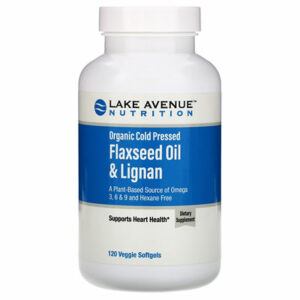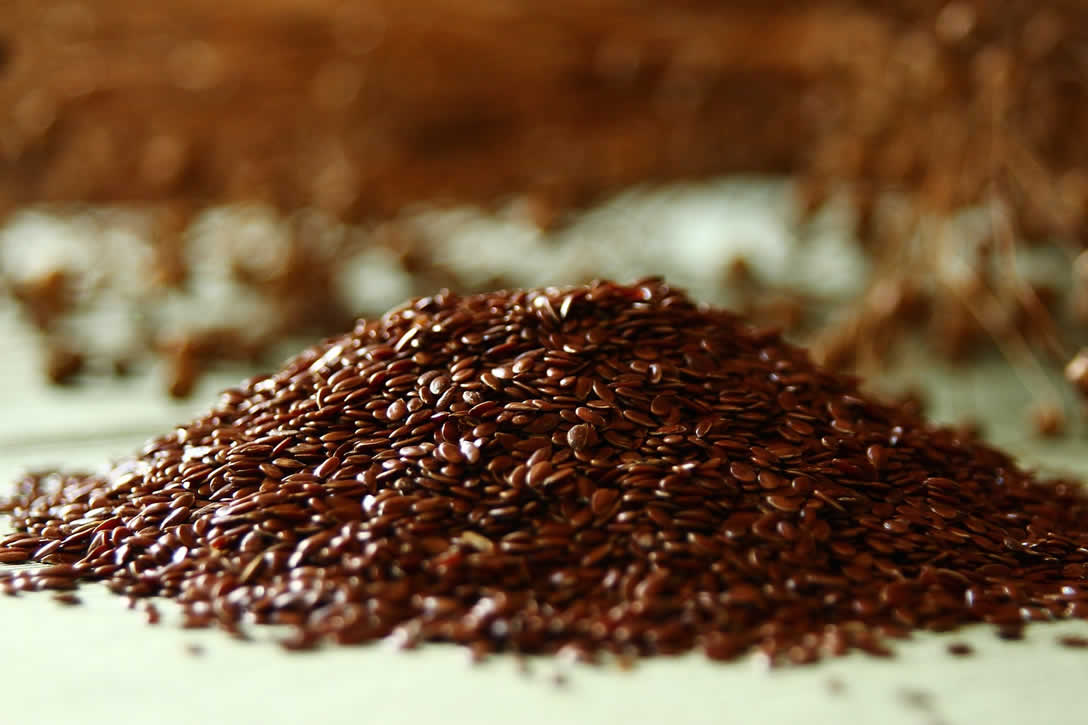Flaxseed is one of the oldest crops in history. It has been planted since the development of human civilization. Its Latin name is Linum usitatissimum, which means a wide range of uses and is currently the most compact functional health food.
Do you know the benefits of flaxseed supplements?
Table of Contents
- What is flaxseed?
- What are the benefits of flaxseed?
- Are there any side effects of flaxseed?
- Where to buy the most recommended organic flaxseed?
What is flaxseed?
Flax seeds are flat-shaped seeds grown in the linseed family. They are yellow to reddish-brown in color and taste slightly nutty. They are particularly rich in omega-3 fatty acids (ALA), short-chain polyunsaturated fatty acids, dietary fiber, Lignans, and phenolic compounds.
Due to the above characteristics, flaxseed has become a health-benefit food with the potential to regulate metabolism and improve chronic diseases.
What are the benefits of flaxseed?
1. Flax seeds are beneficial for blood lipid regulation
Dyslipidemia is a metabolic disorder that leads to a continuous increase in plasma cholesterol and triglyceride concentrations.
There are currently three types of dyslipidemia, hypercholesterolemia, hypertriglyceridemia, and mixed hyperlipidemia, which are caused by abnormally elevated cholesterol and triglycerides
The most common form is hypercholesterolemia, which is defined as a total cholesterol level above 5 mmol/L or 190 mg/L.
According to statistics, the global prevalence of hypercholesterolemia is 39% for men and 40% for women, and nearly one-third of ischemic heart disease is secondary to hypercholesterolemia.
A systematic literature review and meta-analysis (including 62 randomized controlled trials with a total of 3772 participants) pointed out that supplementation of flaxseed (daily doses between 10 g and 60 g) can significantly reduce total cholesterol, triglyceride, and low-density lipoprotein cholesterol concentration (but no effect on high-density lipoprotein cholesterol).
*Conclusion: Flaxseed supplementation can bring positive help to blood lipid regulation, but is limited by the small sample size and high heterogeneity between studies. More studies are needed to corroborate.
2. Flax seeds improve inflammation biomarkers
Inflammation is the immune system’s response to harmful stimuli (such as pathogens, damaged cells, toxic compounds, or radiation), and by eliminating harmful stimuli and initiating the healing process, it is a defense mechanism that is vital to health.
Increased levels of inflammatory biomarkers such as c-reactive protein and fibrinogen have been shown to be common pathogenesis of many chronic diseases, including cardiovascular disease, dementia, intestinal disease, diabetes, arthritis, and cancer.
A systematic literature review and meta-analysis (including 32 randomized controlled trials with a total of 1502 participants) pointed out that ingestion of flaxseed and related derivatives can help reduce high-sensitivity C-reactive protein (hs- CRP) and tumor necrosis factor-Alpha (TNFα), but interleukin-6 and C-reactive protein (CRP) was not significantly improved.
*Conclusion: Oral flaxseed can bring anti-inflammatory benefits, but it is limited by the heterogeneity between studies, and more studies are needed to corroborate.
3. Flax seeds are beneficial for diabetes and blood sugar control
Diabetes is a series of abnormal metabolic diseases caused by high blood sugar, caused by defective insulin secretion, poor dynamics, or both.
The main symptoms of hyperglycemia include polyuria, thirst, weight loss, and sometimes polyphagia and blurred vision.
A meta-analysis of literature (including 25 randomized clinical trials, a total of 2080 participants) pointed out that the ingestion of whole flaxseed (non-linseed oil or lignan extract) can significantly improve blood glucose management related values (such as insulin Resistance index, blood sugar level, insulin level).
The subgroup analysis also pointed out that the improvement was most obvious for those who consumed more than 12 weeks and had higher baseline blood glucose levels.
The underlying mechanism may be related to dietary fiber, plant antioxidants, and Omega-3 fatty acids.
*Conclusion: Flaxseed can bring positive benefits to blood sugar control, but it is limited by the heterogeneity and small sample size between studies, and more large-scale experiments are still needed to confirm.
4. Flax seeds help lose weight
Since the 1980s, the global obesity rate has increased by a factor of three. Overweight and obesity have affected more than one billion people. Although most people will try to lose weight, they are limited by genetic, behavioral, and environmental factors, and the success rate is less than 20%.
Obesity not only affects the appearance but also causes the incidence of type 2 diabetes, hypertension, coronary artery disease, various cancers, and cognitive dysfunction.
A systematic literature review and meta-analysis (including 45 randomized controlled trials involving 2,789 participants) pointed out that flaxseed supplementation has the effects of weight loss, body mass index and waist circumference, and is particularly used for more than 12 weeks of use The ethnic group with a body mass index greater than 27 (kg/m²) is the most significant.
The underlying mechanism is related to the water-soluble dietary fiber contained in it (which can delay gastric emptying and cause satiety) and the anti-obesity effect of omega-3.
*Conclusion: Ingesting whole flaxseed can bring positive weight management effects, and it is more significant for those who are overweight.
5. Flax seeds are good for prostate cancer
Prostate cancer is the top three most common cancers in men, second only to colorectal cancer and liver cancer. There are about one million new cases worldwide each year, and as the population ages, the number of patients over the age of 65 shows a fourfold increase.
In addition to family genetics, currently known risk factors for prostate cancer, race, diabetes, obesity, smoking, vasectomy, diet, smoking, and sexually transmitted diseases may increase the incidence of disease.
A multi-point/randomized controlled trial (a 30-day, 161 patients who want to undergo prostatectomy) pointed out that compared to low-fat or general diet, a diet rich in linseed (30 g per day) can Reduce tumor proliferation rate (measured by Ki-67 tumor cell proliferation index).
The underlying mechanism may be related to the reduction of 5oc reductase, the regulation of natural killer cells, and the activity of vascular endothelial growth factor.
*Conclusion: The intake of flaxseed can bring about prevention and protection of prostate cancer, but the results still need more research and verification.
Are there any side effects of flaxseed?
For most people with good health, it is safe to consume flaxseed in moderation, but it may cause side effects such as bloating, abdominal pain, constipation, diarrhea, stomach pain, and nausea, especially if the gastrointestinal function is poor or overdose at one time.
Safety Precautions
Do not eat raw or immature flaxseeds, as they contain the anti-nutritional substance: Cyanogenic glycosides. If overdose may cause poisoning. The cyanide is a heat-resistant substance, which can be removed by heating.
Do not use if you have an intestinal obstruction, intestinal inflammation, or esophageal stenosis, because excessive fiber may cause symptoms to worsen.
People with low blood pressure or taking blood pressure-lowering drugs should be careful because flaxseed has a blood pressure-lowering effect.
Pregnant women, breastfeeding women, and those with hormone-sensitive symptoms, such as breast cancer, uterine cancer, ovarian cancer, endometriosis, uterine fibroids, etc., because of the nutrient component lignans have weak females Hormonal effects are unknown to users’ safety.
Do not use if you have coagulation dysfunction or take anticoagulants, as they may have anticoagulant effects. Related drugs such as Coumadin, Plavix, aspirin.
People who are diabetic or taking hypoglycemic drugs should use it with caution, as it may have a hypoglycemic effect.
People who use birth control pills or hormone replacement therapy should be careful, because the nutrients in flaxseed may affect hormone levels and interfere with the effects of drugs.
Where to buy the most recommended organic flaxseed?
In recent years, food safety problems in various countries have exploded, and it is not healthy but black-hearted products that everyone spends on. Therefore, European and American products with relatively strict quality control have become popular products.
And iHerb.com is a large-scale medical cosmetics e-commerce company in the United States. It has a high satisfaction rate of 97% in the evaluation of Google customers. It provides global home delivery so that you can buy it without risking buying fakes through purchasing high-quality health products.

